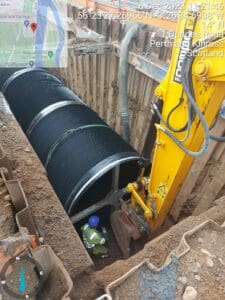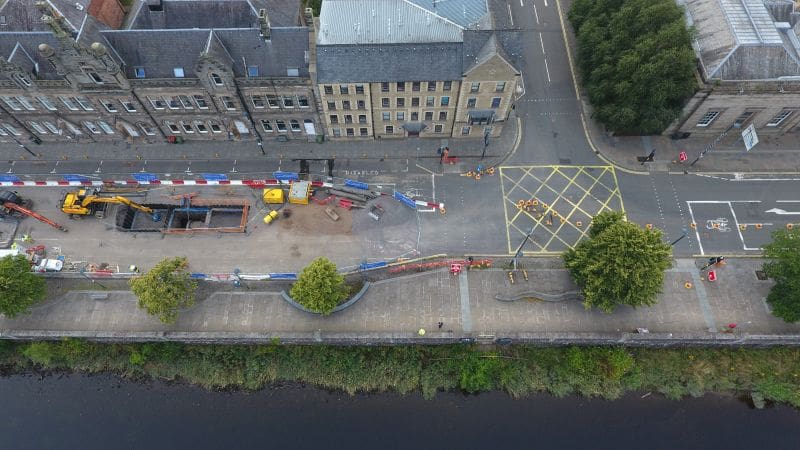A new ‘super sewer’ project solution in Perth has been tipped to save 234 tonnes of carbon.
Aquaspira has provided 520 metres of reinforced steel composite pipes as part of the upgrade to a section of the city’s sewer network. Usually built using concrete pipe for strength, the firm said the manufacture and transport of these would generate significant carbon emissions.
Instead, Aquaspira revealed its high strength, reinforced steel pipe has reduced product mass over a more traditional concrete solution by more than 5,000 tonnes.
The smaller size, coupled with this ‘ultra-lightweight’ solution, has decreased the amount of excavation required by 28%, lowering the environmental impact by reducing fuel consumption and needing fewer vehicle movements to and from site.
The composite pipes are also said to have enhanced site safety and reduced site installation time by approximately 8–10 weeks.
Aquaspira was appointed to the prestigious drainage project, which started in May 2023, by Scottish Water’s capital project delivery partner Caledonia Water Alliance.
A spokesperson for Caledonia Water Alliance said,
“We specified the Aquaspira pipes and access units because it would provide a lower carbon solution, minimise the footprint and shorten programme time. An accredited and adoptable solution is vital and Aquaspira provides this, the added benefit is that the 2.6 metre sections of pipe, coupled with the push-fit access solution, help with the ease of installation.
We’ve been delighted with the product and time savings. Lightweight and strong, the pipes can be handled more swiftly and safely, with much smaller machines and need about a quarter less excavation as well.”

The project will see the installation of new sewers to manage an expected growth in Perth’s population. It will also manage flood risk by improving the network’s resilience to and capacity for intensive rainfall.
Following survey and modelling work carried out by Scottish Water, in partnership with Perth & Kinross Council, the £107 million infrastructure investment is now underway and the Tay Street and Shore Road Sewer upgrade with the new super sewer is one of the key projects. It is set to complete in January 2025.
David Lavery, Scottish Water’s senior project manager, commented,
“While we are adapting our infrastructure to a changing climate, we also need to play our full part in addressing its causes. Scottish Water has set a challenging target to go beyond net zero emissions across all of our work by 2040, including the delivery of our significant investment programme. Finding lower carbon ways to build new infrastructure is a crucial part of that journey.
Modern sewers of this scale would ordinarily be built using concrete pipe to achieve the required strength, but manufacturing and transporting these across long distances generates significant carbon emissions. The composite steel pipe being used has a lower carbon cost and is much lighter, while having higher strength than could be achieved using plastic pipe at this scale.”
Mark Stanway, director at Aquaspira, added,
“As well as providing technical support, design optimisation and provision of information to enable a detailed carbon evaluation, we also ensured the installation team was fully briefed on all aspects of the installation process working closely with the site manager to establish delivery schedules to suit the programme.
In addition to the 2.25m diameter steel-reinforced pipes, our solution also includes prefabricated access units. These push-fit solutions reduced the installation of each manhole from an average of four days to around an hour, delivering dramatic cost and time savings to the job, as well as providing a far more environmentally friendly and safer solution.
Ultimately, we reduced the number of vehicle movements to site by over 65%, as well as cutting the amount of bedding and backfill. The project is now running ahead of programme, partly due to the installation efficiencies of the pipe and access units, helping to reduce disruption for the local community.”
Lancashire-based Aquaspira has been investing in research and development which has seen the use of recycled materials in its products increased, as well as using solar power in the manufacturing process to further de-carbonise. The company is working with the University of Birmingham to develop a digital twin to improve design and investigate the use of recycled materials for backfill to further reduce carbon usage and use sensors in pipes for long-term monitoring and maintenance

